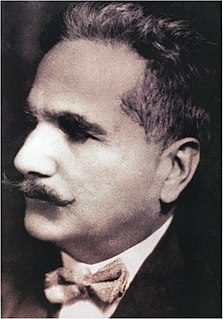Pakistan literature is a distinct literature that gradually came to be defined after Pakistan gained nationhood status in 1947, emerging out of literary traditions of the South Asia. The shared tradition of Urdu literature and English literature of British India was inherited by the new state. Over a big time of period a body of literature unique to Pakistan has emerged in nearly all major Pakistani languages, including Urdu, English, Punjabi, Seraiki, Balochi, Pushto and Sindhi.
Kaleem Omar (KO) was a Pakistani journalist, and an English language poet.
Khalid Hasan was a Pakistani journalist and writer. Author and editor of several books, in addition to being a regular columnist for a number of English-language Pakistani newspapers, he is best known for his translations of the short stories of Saadat Hasan Manto and the lyrics of Faiz Ahmed Faiz.
Pakistan has a rich and diverse tradition of poetry that includes Urdu poetry, English poetry, Sindhi poetry, Pashto poetry, Punjabi poetry, Saraiki poetry, Baluchi poetry, and Kashmiri poetry. Sufi poetry has a strong tradition in Pakistan and the poetry of popular Sufi poets is often recited and sung.

Zulfikar Ghose is a novelist, poet and essayist. A native of India and current resident of Texas, his works are primarily magical realism, blending fantasy and harsh realism.
Ahmad Hassan Dani FRAS, SI, HI, was a Pakistani archaeologist, historian, and linguist. He was among the foremost authorities on Central Asian and South Asian archaeology and history. He introduced archaeology as a discipline in higher education in Pakistan and Bangladesh. Throughout his career, Dani held various academic positions and international fellowships, apart from conducting archaeological excavations and research. He is particularly known for archaeological work on pre-Indus Civilization and Gandhara sites in Northern Pakistan. He was also the recipient of various civil awards in Pakistan and abroad.

Khan Bahadur Captain Sir Sikandar Hayat Khan, KBE, MBE (Mil.), also written Sikandar Hyat-Khan or Sikandar Hyat Khan, was a statesman from the Punjab. He held the office of Prime Minister of the Punjab among other positions.
This is a selective list of scholarly works related to Muhammad Iqbal, the poet-philosopher of the Indian subcontinent.
The publishing industry in Pakistan is hampered both by a low literacy rate (48%).

Ghulam Mustafa Tabassum, was a 20th-century poet. His pen name was Tabassum.

Abdur Rahman Chughtai was a painter artist and intellectual from Pakistan, who created his own unique, distinctive painting style influenced by Mughal art, miniature painting, Art Nouveau and Islamic art traditions. He is considered to be 'the first significant modern Muslim artist from South Asia', and the national artist of Pakistan.
Ihsan H. Nadiem is a Pakistani archaeologist, museologist, author and poet.
Abid Ali Abid was an Urdu and Persian poet and educator who was born on 17 September 1906 in Dera Ismail Khan, British India and died in Lahore, Pakistan on 20 January 1971.
Ahmad Salim or Muhammad Salim Khawaja is a writer, archivist and co-founder of the South Asian Research and Resource Centre, a private archive established in 2001. He currently lives in Islamabad.
Malik Barkat Ali was a Muslim Indian politician, lawyer and journalist.

Khan Abdul Majid Khan Tarin (1877–1939), Khan-Sahib, OBE, was a prominent magistrate, MLA and philanthropist of the North West Frontier Province of former British India.
Pakistani English literature refers to English literature that has been developed and evolved in Pakistan, as well as by members of the Pakistani diaspora who write in the English language. English is one of the official languages of Pakistan and has a history going back to the British colonial rule in South Asia ; the national dialect spoken in the country is known as Pakistani English. Today, it occupies an important and integral part in modern Pakistani literature. Dr. Alamgir Hashmi introduced the term "Pakistani Literature [originally written] in English" with his "Preface" to his pioneering book Pakistani Literature: The Contemporary English Writers as well as through his other scholarly work and the seminars and courses taught by him in many universities since 1970's. It was established as an academic discipline in the world following his lead and further work by other scholars, and it is now a widely popular field of study.

Sir Muhammad Iqbal (KB)(; Urdu: محمد اِقبال; 9 November 1877 – 21 April 1938), widely known as Allama Iqbal, was a poet, philosopher and politician, as well as an academic, barrister and scholar in British India who is widely regarded as having inspired the Pakistan Movement. He is called the "Spiritual Father of Pakistan." He is considered one of the most important figures in Urdu literature, with literary work in both Urdu and Persian.

Taufiq Rafat, was a Pakistani author and poet. His work influenced other Pakistani poets and he is credited with the introduction of the concept of a "Pakistani idiom" in English literature.







